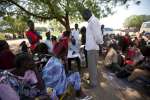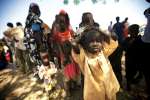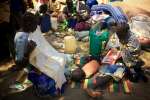- Text size
 |
|  |
|  |
| 
- Français
Thousands of Sudanese refugees increasingly at risk from fighting
News Stories, 9 December 2011
NAIROBI, Kenya, December 9 (UNHCR) – The UN refugee agency said Friday it was worried about some 20,000 refugees in South Sudan who are increasingly at risk as fighting rages near the border with Sudan.
Chief spokesperson Melissa Fleming said that while military confrontations in the border area of Jau have not directly affected nearby Yida refugee settlement, fears of attack have sent some refugees fleeing into the bush. "The escalating insecurity has also affected humanitarian access and the flow of aid, causing assistance at Yida to be disrupted repeatedly," she told journalists in Geneva.
UNHCR continues to work with partners in Yida to provide emergency services such as food, water and health care for the refugees, who have fled Sudan's Southern Kordofan region in recent months. Between 60 and 110 people continue to arrive in Yida every day.
"We fear that the fighting could spread to Yida, which was hit by air strikes in November. UNHCR is speeding up efforts to relocate the refugees away from the volatile border, to new sites that can offer more safety and assistance further inside South Sudan," Fleming said.
So far, most refugees have been reluctant to leave Yida and move further from their homes in Sudan. They are also worried about the risk of landmines on the roads further inland. To ensure safe passage, the UN Mine Action Centre is doing mine surveys and clearance. "We hope to relocate a first group of willing refugees very soon," Fleming noted.
Meanwhile in the eastern part of South Sudan, refugees are still arriving at a rate of 650 per day after fleeing Sudan's Blue Nile state. A group of 10,000 refugees were recently identified near Elfoj in Maban county of South Sudan's Upper Nile state.
Thousands more are believed to be stranded in remote locations along the border. UNHCR and partners are working on a new settlement in Maban county to accommodate them, in addition to Doro site that already hosts 20,000 recent arrivals from Blue Nile.
In total, South Sudan has received more than 50,000 refugees from Sudan's Blue Nile and Southern Kordofan states in recent months.
Neighbouring Ethiopia has received nearly 33,000 Sudanese refugees since June, the vast majority fleeing Blue Nile state. This includes more than 18,000 recent arrivals hosted in two camps and a transit centre, and an estimated 14,000 living among the host community in the border areas. Together with the local authorities, UNHCR is expanding existing refugee camps in order to relocate refugees living with local families.


















































